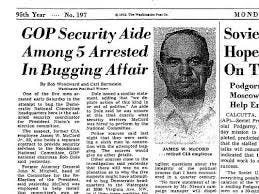This day in history
The Washington Post earned its reputation as a world-class newspaper by its relentless pursuit of what the Nixon White House called a “third-rate burglary” at Democratic National Committee headquarters on June 17, 1972.
Fifty-two years later that reputation is teetering on collapse based on “blagging,” — a British tabloid journalism tradition of using misrepresentation to dupe others into revealing confidential information — a tradition practiced by the Post’s publisher and incoming editor and learned at Rupert Murdoch-owned publications in Britain.
Spelled out in lengthy pieces on NPR, the New York Times and, to its credit, the Post, the stories raise serious questions about the ethics of publisher Will Lewis and incoming editor Robert Winnett.
Not to mention the vetting process that led to Lewis’ hiring by Post owner Jeff Bezos.
The Watergate break-in made the journalism careers of two junior reporters who handled the weekend cop story because the national desk didn’t think much of the fact that five men with burglary tools were found in the offices of DNC Chairman Larry O’Brien five months before a presidential election.
But the dogged determination of Bob Woodward and Carl Bernstein uncovered a trail of political corruption that eventually led to the resignation of Richard M. Nixon after the Supreme Court ordered the release of a “smoking gun” tape in which Nixon acquiesces to a proposal from his chief of staff, H.R. Haldeman, to buy the silence of those involved in a plot to influence the outcome of the 1972 election.
“…when you open that scab, there's a hell of a lot of things. And then "we just feel that this would be very detrimental to have this thing go any further, that this involves these Cubans, and Hunt, and a lot of hanky-panky that we have nothing to do with ourselves.”
That court decision led a group of prominent Republicans to visit Nixon and tell him unless he resigned he would be impeached and convicted.
Sound familiar? Except of course for the Supreme Court and Republican leaders doing the right thing.
Woodward and Bernstein did what journalists call “shoe leather reporting,” going out and talking to sources and verifying what they were told before publishing. In the American tradition (except for the National Enquirer), they never paid a source for information.
Unlike Lewis and Winnett, who can be said to practice the Murdoch tradition of buying information.
“Among the episodes: a six-figure payment for a major scoop; planting a junior reporter in a government job to secure secret documents; and relying on a private investigator who used subterfuge to secure private documents from their computers and phones. The investigator was later arrested.”
And attempting to buy the silence of NPR media reporter David Folkenflik with Lewis offering an exclusive interview in exchange for dropping a story about British court proceedings involving Lewis. After failing to convince now former executive editor Sally Buzbee to also pass on that story.
Within weeks, Lewis announced a reorganization he said would stanch the Post’s financial bleeding. A plan included creation of a “third newsroom” focused on social media, to be run by Buzbee while Winnett, who has never worked in American journalism, would take over her job after the election.
It was an offer Buzbee could and did refuse.
To his credit, Lewis did install former Wall Street Journal editor Matt Murray as Buzbee’s interim replacement, a solid journalist who clearly is not trying to quash reporting about his publisher and eventual replacement.
This steady drip of bad press raises serious questions about the future of Lewis and Winnett. But it also raises the question of who decided Lewis was the best choice to lead the Post into the future.
Bezos, who has maintained a hands-off approach to news coverage, left the task to trusted aide Patty Stonesifer, who he named as interim publisher after the previous job holder, Fred Ryan, stepped down.
A trusted Bezos aide, she had no background in journalism, except by marriage to Slate Magazine founder Michael Kinsley. ZRG Partners, a “global talent advisory firm” that doesn’t show up in a Google search of media recruiters, handled the process.
The obvious question is when will Bezos decide to cut his losses?


